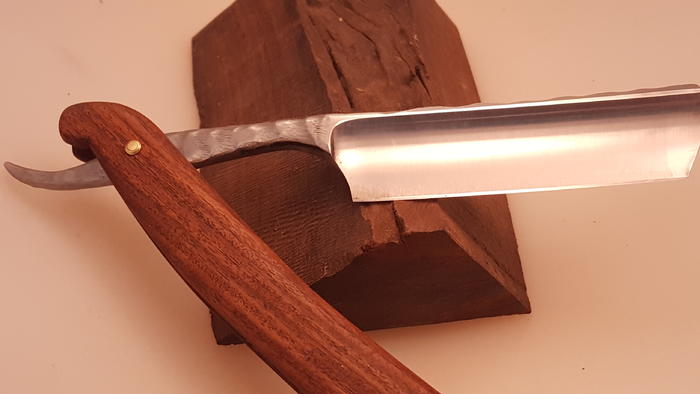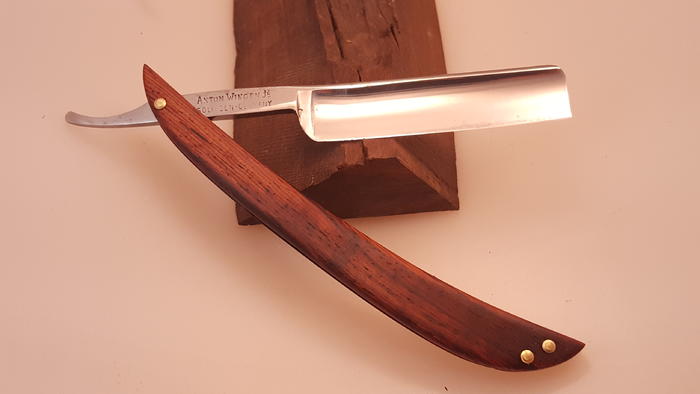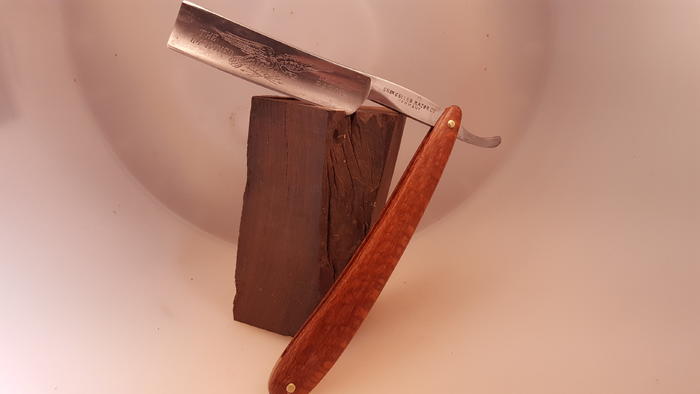Results 1 to 10 of 22
-
10-16-2020, 03:19 AM #1
 Why the difference....identical honing, different feel between razors
Why the difference....identical honing, different feel between razors
I have been using SR for about 3 years. More recently started doing some light restoration, eventually would like to build from scratch.
I have been using a RedDot SR for most of the time as well and an old Sheffield. I recently restored/rescaled several new to me SRs.
My honing is identical on all. 3k bevel set, 8k, then 12 finish then strop.
The Sheffield is the best by far. Butter smooth. The RedDot close second. My new acquisition (Unexcelled Razor Co, Germany—-The Improved Eagle Razor) looks good but just does not do as well. Much more rough. I also did a second one with identical blade type as my Red Dot with a (AntonWingen J-Solingen) but it just underperforms.
Amazingly a friend gave me a buggered up Golden dollar that I modified so it could should its face in public and it shaves great!
Does it come down to actually steel type? I don’t understand.
I will try and include pics of my restores.
Golden Dollar with Bolivian rosewood scales, brass/African Blackwood wedge, heavily modified

Anton Wingen with cocobolo scales

Unexcelled Razor Co. with Lacewood/Leapardwood scales

Last edited by woodscavenger; 10-16-2020 at 03:34 AM. Reason: Add pics
-
10-16-2020, 03:42 AM #2Senior Member

- Join Date
- Sep 2020
- Location
- Austin, TX
- Posts
- 653
Thanked: 56
I'd use the advanced search at the top of the thread and search for honing discussions by euclid440. His discussions are very detailed and informative.
If you're wondering I'm probably being sarcastic.
-
10-16-2020, 08:58 AM #3

I may be taking you too literally but reminds me of that quote about doing the same thing and expecting different results only this time you're expecting identical results

Different steels will require a different approach, as in maybe more or less time on stones which in turn may influence the bevel setting which then influences everything.
End game is another thing & finessing a final edge can also require more or less strokes on individual razors & possibly a different finishing stone.
The state of the steel can be another factor. Restorations usually mean a degree of rust which can sometimes compromise the edge.
Some razors have a high consistency of quality others can be hit and miss.
If you can hone most razors to a similar level then how long they hold that edge becomes the next issue.
Lottsa fun isn't it The white gleam of swords, not the black ink of books, clears doubts and uncertainties and bleak outlooks.
The white gleam of swords, not the black ink of books, clears doubts and uncertainties and bleak outlooks.
-
10-16-2020, 10:03 AM #4

Just a guess here but bevel setting with a 3k? Possibly you dont have a proper bevel set? I guess you could set on 3k but it sure will take some time. Most around here start at 1k or maybe 2k if the bevel is in good shape. But after restoring, sanding, polishing, killing the edge, id want to start at 1k to be sure i got the bevel set right. After a restore some folks go even lower to start just the reshape and take away any bad steal that might be in the edge/bevel.
Oz is also right about different steels. This is why so.e guys prefer the Sheffield over German or... The hardness makes a big difference in how it will hone and feel.
That GD sure have been ground on to change the shape that much. It sure looks different now.
Marty should pop in sometime and give you some hints. But for now, welcome to SRP.Last edited by Gasman; 10-16-2020 at 10:06 AM.
It's just Sharpening, right?
Jerry...
-
10-16-2020, 01:05 PM #5Senior Member



- Join Date
- Apr 2012
- Location
- Diamond Bar, CA
- Posts
- 6,553
Thanked: 3215
Steel does play a part, and with vintage razors, we have no idea about the conditions they have experienced. Blade design also plays a big part.
For example, your Unexcelled razor is a shoulder less hollow ground. It is very possible if you hone with too much pressure, you could lift the edge off the stone. If the edge is off the stone, you cannot hone it.
Your Wingen, was a razor ahead of its time, made with the finest steel and very well ground. Wingmen probably made razors for Bresduck, the lines of your razor are similar to a Duck, which are wicked shavers. Export razors were sold as Ducks, razors for Europe were stamped Wingen or later Othello. It should deliver a superior edge.
But that razor needs heel correction and is being honed on the stabilizer, note the marks and excessive wear on the spine over the heel. The stabilizer is most probably keeping the heel half of the razor off the stone.
As said, a razor that has been “repaired” is not a garden variety honing but is itself a repair to set a bevel. Doing so on a 3k could be challenging for most. It can be done, but again you must be careful not to use too much pressure on shoulder less razors but enough to keep the bevel flat on the stone.
Also, if you are using a 3k Super Stone, which tend to load up quickly, one must refresh the stone regularly to ensure a flat, aggressive cutting surface.
As said each razor must be approached differently, you must do what it needs. Most probably your bevels are not fully set.
Do you have good magnification?Last edited by Euclid440; 10-16-2020 at 01:49 PM.
-
10-16-2020, 02:02 PM #6Senior Member

- Join Date
- Jan 2019
- Location
- north florida
- Posts
- 125
Thanked: 10
+1 there is difference in metals, grinds, the condition of. Razor, how previous owner honed, macro, and micro flaws, even though you say you are using identical honing, one errant lap so strop can change things. Your test has many variables.
Apples to oranges. I am currently working on a 7 day set. This allows me to test near identical razors and takes away / limits many variables. I would suggest getting 2 or same razors and run your test. And see if those provide similar feel. Apples to apples
What stones are you using? This can also be causing some variables. I take all my razors new to me to 1k I like to think that this erases most of previous owners work, and increase my influence on the edge. Also how you maintain a stone will influence edge. A freshly lapped or refreshed stone will provide feel than a glazed stone
Like above reply, using magnification will get your honing much more consistent, observing scratch pattern change, polish, micro flaws. I use a inexpensive carson micro brite hand held microscope most of the time.
Technical Straight edge.... will allow you to check stones for being consistently flat, and to check razor if it is twisted, smiling , frowning........
User error.... can cause a great deal of difference not only in honing but in shave technique.
Some steel favors certain stones. My favorite edge is from kitta jnat and Swedish steel. While vintage NY, Bradford PA steel plays well with all stones. theirs issard likes faster cutting stones....You will enjoy testing razors’ feel on different stones
-
10-16-2020, 02:14 PM #7

Depends on many factors. First, there is your honing. Identical? Since your razors are not identical, that could pose a problem. How are you verifying your bevel and your progression at each stage? Don't you find the 3k to be a bit too fine for setting the bevel on some razors? I would never dream of starting finer than 600 grit for most razors. Most guys start with 1k and coarser. I suggest getting at least the 1k Naniwa SuperStone. For faster steel removal on razors that need a lot of it, you can of course take it partway there with wet/dry sandpaper stuck to a flat plate such as my favorite, 3/4" x 3" x 12" acrylic.The 600 grit Chosera is popular, and I also like my 320 grit Kuromaku sometimes, for getting the heavy lifting done. It all depends on the razor and what condition it is in and what needs to be done.
Some razors will be easier to put a fine edge on than others. Different alloys. Different heat treating. Different tempering. Different grind. It should be no surprise that different razors shave differently or hone differently. Sometimes different means better or worse. Sometimes it just means different.
-
10-16-2020, 02:23 PM #8Senior Member

- Join Date
- Jun 2014
- Location
- Eastern Washington State USA
- Posts
- 406
Thanked: 59
All good advice so far. I would also add grain size and heat treating to the list of variables.
Depending on how the blade was formed (cast, forged, hot rolled, cold rolled, etc...) will subject it to different temperatures for different amounts of time and for a various number of times. All of this can effect grain growth. If the steel wasn't properly normalized after all of this, then it can perform much differently then the exact same piece of steel that is otherwise identical. You can absolutely ruin good steel in a forge.
Assuming that you have a good piece of steel that has been properly formed into a blade and then normalized, you can now totally make it worthless if you screw up either the hardening or the tempering.
To me this is all part of the challenge of making a good consistent razor. Also, razors seem to magnify all of this. I can forge out a good hunting knife no problem. People will never notice if my temperatures were slightly off. Do that on a razor though and I will hear about it. The edge is so fine on a razor and we have direct feedback on our sensitive face, that we notice every little detail. I guess this is why I like making razors. It pushes me to make the very best that I can.
-
10-16-2020, 02:32 PM #9At this point in time...




- Join Date
- Jun 2007
- Location
- North Idaho Redoubt
- Posts
- 27,026
- Blog Entries
- 1
Thanked: 13245
Someplace on here are a couple of threads I did along with the owner of a 7 day set I think in 2009
A blind test on 7 razors all honed with different finishers
It is a interesting read
Looking for the links
Okay found the first thread it was 2011
https://sharprazorpalace.com/honing/...7-day-set.html
Next two threads
https://sharprazorpalace.com/honing/...7-day-set.html
https://sharprazorpalace.com/honing/...ving-test.html
As you can see it was done pretty tight and the reads are interesting when looking at Identical razors
Once you add in all the new variabls from different razors it gets to be really fun hehehehe
Hone On !!!Last edited by gssixgun; 10-16-2020 at 02:56 PM.
"No amount of money spent on a Stone can ever replace the value of the time it takes learning to use it properly"
Very Respectfully - Glen
Proprietor - GemStar Custom Razors Honing/Restores/Regrinds Website
-
10-16-2020, 03:30 PM #10

Very good advice above. Also add into that bevel angle. Are you taping the spine... How much tape? Is there hone wear? How thick is the spine? There are lots of variables that affect this. Razors are in a way similar to blues music. It seems so simple but in that simplicity lies a hidden complexity. The geometry of a razor has to be so precise for it to perform at the level that we expect. There are good threads on here about bevel angle which you can check and adjust with tape etc, etc. I think DVW or maybe crescentcityrazors posted one someplace (Maybe one of you guys can add a link) but a very oversimplified answer to that is a four to one ratio width to spine thickness.
I would also consider 3k as being more of a mid level stone. For my 2¢ worth If you are going to get a 1K, which would be my suggestion to have regardless of what else you have, I would consider possibly a King or a Sharpton over a Nortonas the Norton that I have has a tendency to make edges a little chippy sometimes. You can work around it by keeping the stone cleaned and dressed properly but why add more variables?Last edited by PaulFLUS; 10-16-2020 at 03:48 PM.
Iron by iron is sharpened, And a man sharpens the face of his friend. PR 27:17


 57Likes
57Likes LinkBack URL
LinkBack URL About LinkBacks
About LinkBacks






 Reply With Quote
Reply With Quote

